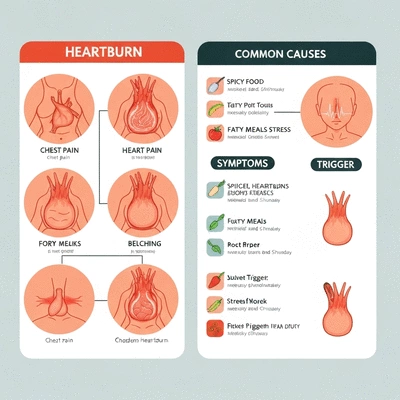Did you know heartburn affects millions of people, yet many are unaware of how certain medications can exacerbate their symptoms? Understanding these connections is crucial for effective management and long-term health.
What You Will Learn
- Heartburn is caused by the backflow of stomach acid into the esophagus, leading to discomfort and various symptoms.
- Certain medications, including Proton Pump Inhibitors (PPIs) and NSAIDs, can worsen heartburn symptoms.
- Regular evaluation of your medications is essential to manage heartburn effectively and minimize potential risks.
- Keeping a food and symptom diary can help identify personal triggers for heartburn, aiding in better management.
- Open communication with your healthcare provider is vital for developing a tailored treatment plan for heartburn.
Heartburn Medications: Relief vs. Risk
Explore common medications for heartburn, understanding their role in symptom management and potential risks with long-term use.
Understanding PPIs
Proton Pump Inhibitors (PPIs) reduce stomach acid. While effective for relief, long-term use can create dependency and other issues.
H2RAs Functionality
Histamine-2 Receptor Antagonists (H2RAs) also lower stomach acid. Some users report increased heartburn after prolonged use.
Calcium Channel Blockers
Prescribed for blood pressure, these can relax the LES, thereby worsening heartburn symptoms for some individuals.
NSAIDs & Other Culprits
Nonsteroidal anti-inflammatory drugs (NSAIDs) like ibuprofen are known for stomach irritation, exacerbating heartburn.
Understanding Heartburn and Its Medication Links
Heartburn can feel like an unwelcome guest after a meal, making it essential to understand what it is and how it affects our bodies. Essentially, heartburn occurs when stomach acid flows back into the esophagus, leading to that burning sensation in your chest. It’s important to recognize the symptoms associated with heartburn, which often include:
- A burning sensation in the chest
- Acidic taste in the mouth
- Difficulty swallowing
- Dry cough or hoarseness

These symptoms might vary from person to person, but if you’ve experienced them, you know how disruptive heartburn can be to your daily life. As the founder of Heartburn Health Hub, I’ve seen countless individuals struggle with this uncomfortable condition, often not realizing that certain medications can actually worsen their heartburn symptoms.
What Is Heartburn and Its Symptoms?
Heartburn is more than just an occasional annoyance; it can become a chronic condition for many people. The main culprit, as I mentioned earlier, is the reflux of stomach acid into the esophagus. This happens when the lower esophageal sphincter (LES) fails to close properly, allowing acid to escape. Understanding your symptoms is the first step in managing heartburn effectively! For more detailed information on acid reflux and its mechanisms, you can refer to resources from reputable organizations like GI.org (American College of Gastroenterology).
To navigate this condition, it’s crucial to identify any potential triggers in your lifestyle or diet. Keeping a journal can help you pinpoint specific foods or situations that exacerbate your heartburn, enabling you to make better choices in the future. Remember, you're not alone in this journey!
Common Medications Associated with Worsening Heartburn
Medications play a significant role in managing heartburn, but some can actually contribute to the problem. Below, I’ve highlighted several common medications that might worsen heartburn:
- Proton Pump Inhibitors (PPIs)
- Histamine-2 Receptor Antagonists (H2RAs)
- Calcium Channel Blockers
- NSAIDs and Other Common Culprits
It's essential to evaluate your medications regularly, especially if you find yourself experiencing heartburn frequently. Knowing how each of these medications impacts your digestive health can help you work with your healthcare provider to create an effective treatment plan!
Proton Pump Inhibitors (PPIs) and Their Role
PPIs, such as omeprazole, are widely prescribed for heartburn relief as they reduce the production of stomach acid. However, long-term use can lead to a host of other issues, including a potential dependency on the medication. It's crucial to assess whether continuing this medication is the right choice for you! For further insights into the risks associated with long-term PPI use, consider reviewing studies such as those published on PMC (PubMed Central).
Histamine-2 Receptor Antagonists (H2RAs): How They Function
H2RAs, like ranitidine, are another class of medications that lower stomach acid. While they can be effective for many, some patients report experiencing increased heartburn after prolonged use. If you're using H2RAs, consider discussing their effectiveness with your doctor!
Calcium Channel Blockers: How They Contribute to Symptoms
Calcium channel blockers, often prescribed for high blood pressure, can relax the lower esophageal sphincter, leading to worsened heartburn symptoms. It's essential to keep this in mind if you're taking these medications and experiencing discomfort.
NSAIDs and Other Common Culprits
Nonsteroidal anti-inflammatory drugs (NSAIDs), like ibuprofen or aspirin, are notorious for causing stomach irritation. If you suffer from heartburn, using these over-the-counter pain relievers may exacerbate your symptoms.
Evaluation of Over-the-Counter Medications for Heartburn Relief
While over-the-counter medications can provide quick relief, they aren't a one-size-fits-all solution. It's essential to evaluate how effective these medications are for your specific needs. Consulting with a healthcare professional can provide valuable insights into the best options for managing your heartburn. The FDA provides comprehensive information on over-the-counter heartburn treatments, which can be a helpful resource.
Interactive Poll: Your Heartburn Experience
We want to hear from you! Have you recently experienced heartburn, and if so, which factor do you believe contributed the most? Select one of the options below:
Frequently Asked Questions About Heartburn and Medication
- What is heartburn?
- Heartburn occurs when stomach acid flows back into the esophagus, causing a burning sensation in the chest. It can also lead to symptoms like an acidic taste, difficulty swallowing, and a dry cough.
- Can certain medications worsen heartburn?
- Yes, several medications can exacerbate heartburn. These include Proton Pump Inhibitors (PPIs), Histamine-2 Receptor Antagonists (H2RAs) if used long-term, Calcium Channel Blockers, and Nonsteroidal Anti-inflammatory Drugs (NSAIDs).
- What are PPIs and how do they affect heartburn?
- PPIs (Proton Pump Inhibitors) reduce stomach acid production and are used for heartburn relief. However, long-term use can create dependency and may lead to other health issues.
- Why should I evaluate my over-the-counter heartburn medications?
- While OTC medications offer quick relief, they are not a universal solution. Regularly evaluating their effectiveness and consulting a healthcare professional ensures you're using the best options for your specific needs and avoiding potential risks.
- How important is communication with my doctor about heartburn?
- Open communication with your healthcare provider is vital. It allows you to discuss symptoms, medication side effects, and concerns, helping tailor a treatment plan that considers your individual needs and potential risks.
Summarizing Key Takeaways on Heartburn and Medications
When it comes to heartburn management, understanding the interplay between symptoms, medication, and lifestyle choices is crucial. Heartburn affects millions, and many find themselves reaching for medications to alleviate the discomfort. However, it's essential to recognize that while these medications can provide relief, they may also come with risks. Being informed allows you to make better choices about your health!

Here are some key takeaways to keep in mind:
- Heartburn can be triggered by various factors, including certain medications.
- Prolonged use of medications like PPIs can lead to more significant health issues.
- Maintaining open dialogue with your healthcare provider is vital for effective management.
As a gastroenterologist, I encourage individuals to consider not just the immediate relief that medications provide but also the long-term effects they might have on your health. Taking a holistic approach can lead to better outcomes in managing heartburn.
Understanding Your Risks and Making Informed Decisions
Being proactive about your heartburn treatment means understanding the risks associated with long-term medication use. Some common health risks may include:
- Potential cardiovascular issues related to certain heartburn medications.
- Negative impacts on digestive health and kidney function.
- Increased likelihood of dependency on medications, leading to challenges when tapering off.
It's not just about what medication you take but also about being aware of how these choices can affect your overall health. At Heartburn Health Hub, we aim to empower you to navigate these decisions confidently and safely!
The Importance of Open Communication with Your Healthcare Provider
One of the most valuable resources in managing your heartburn is your healthcare provider. Open communication allows you to discuss your symptoms, medication side effects, and any concerns you may have. Here are a few ways to ensure this communication is effective:
- Be honest about your symptoms and how often they occur.
- Discuss any medications you currently take and their effects on your heartburn.
- Ask about potential alternatives or adjustments to your treatment plan.
By fostering a genuine dialogue with your healthcare provider, you can create a tailored plan that considers both your needs and the risks involved. Remember, knowledge is power, especially when it comes to your health!
Next Steps for Managing Your Heartburn
Creating a Personalized Treatment Plan
Every individual's experience with heartburn is unique, so developing a personalized treatment plan is essential. This plan should encompass all aspects of management, from medication to lifestyle adjustments. Here’s how you can get started:
- Identify specific triggers for your heartburn.
- Discuss dietary preferences and how they impact your symptoms.
- Incorporate stress management techniques and consider non-pharmacologic options.
As we discussed earlier, understanding your body and how it reacts can significantly influence your management strategies. At Heartburn Health Hub, we're here to help you create a plan that works for you!
Incorporating Patient Education for Better Heartburn Management
Education is a key component in managing heartburn. The more you know, the better equipped you are to handle your symptoms. Some ways to enhance your knowledge include:
- Reading articles and guides on heartburn and its management.
- Participating in community support groups for shared experiences.
- Consulting with your healthcare provider about ongoing research and findings.
By actively seeking out information, you empower yourself to make informed decisions about your health!
Resources for Ongoing Education and Support
Staying informed about heartburn management involves utilizing a variety of resources. Here are some recommendations for where you can find reliable information:
- Visit Heartburn Health Hub for evidence-based articles and guides.
- Join online forums where you can connect with others facing similar challenges.
- Follow reputable health organizations for updates and new research.
Connecting with reliable resources can make a difference in your heartburn journey. Remember, taking charge of your health is a continuous process— and you're not alone!
Recap of Key Points
Here is a quick recap of the important points discussed in the article:
- Heartburn is caused by stomach acid flowing back into the esophagus, leading to discomfort.
- Common symptoms include a burning sensation in the chest, difficulty swallowing, and a dry cough.
- Certain medications, like PPIs and NSAIDs, can worsen heartburn symptoms.
- Keeping a journal can help identify triggers for heartburn.
- Maintaining open communication with your healthcare provider is crucial for effective heartburn management.










